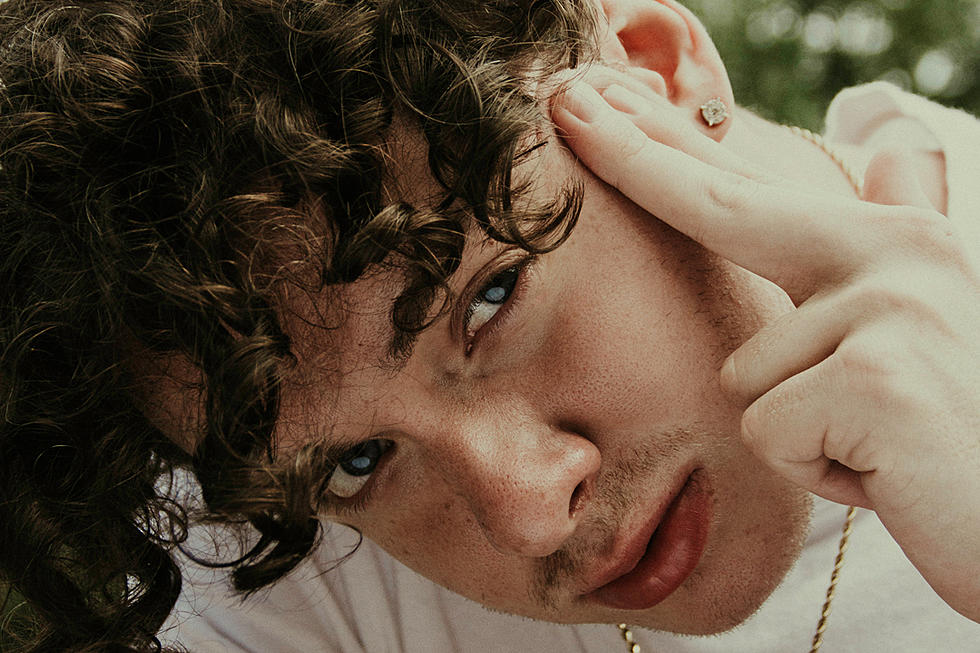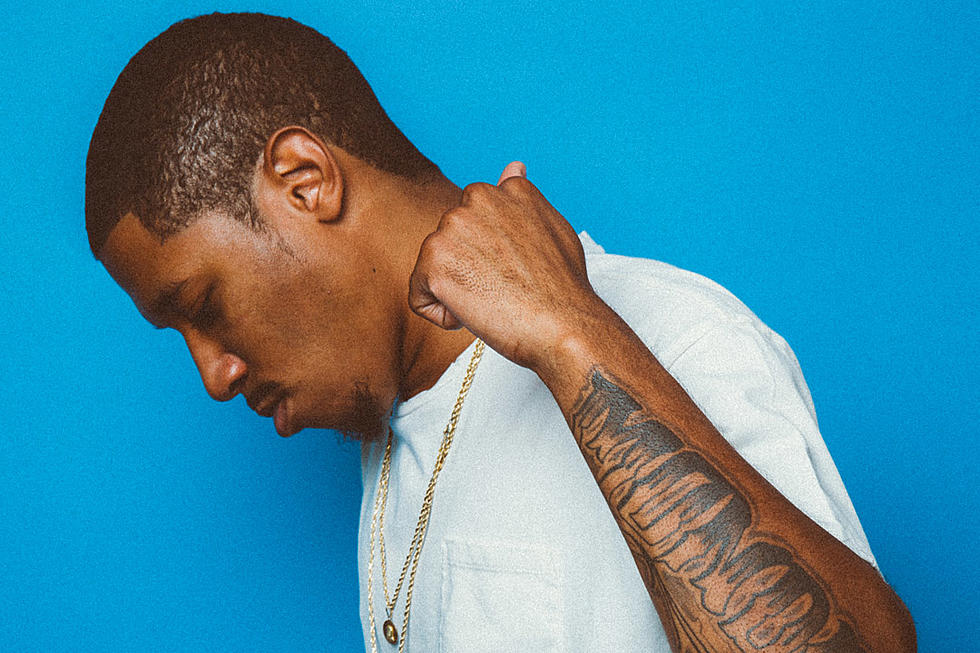
The Come Up: Tree
Chicago is in the midst of having their big moment in hip-hop. New rappers like Chief Keef and Chance The Rapper have helped shine a spotlight on the city’s aesthetically diverse scene. One of the older ones out of the bunch is Tree, whose profile has raised ever since the release of his 2012 mixtape Sunday School. The 29-year-old, from Cabrini Green housing projects, is carving his own lane with dusty soul samples coupled with a unique raspy voice. To hip-hop purists, Tree’s appeal comes from music that stimulates listeners with clever lyricism that’ll make you rewind it back. There's no denying he has put in time and effort to create something special outside of his regional influences.
Today, his much-talked about sequel, Sunday School II: When Church Lets Out, drops today, and we wanted to find out more about the buzzing producer/rapper. Since receiving critical praise from the likes of Fake Shore Drive to SPIN and Complex, Tree has aligned himself with Creative Control to help him get more recognition in 2013. XXL caught up with Tree to find out what life was like growing up in Cabrini Green, the definition of a "Soul Trap", and his growth found in his new project.—As told to Eric Diep (@E_Diep)
More Tree:
On his rap name:
Tree: "I got my name from my name—believe it or not. My name is Tremaine. My grandmother started calling me Tree as a baby. It just kept coming around. It stayed with me through grammar school and high school. And eventually, I started to just go by Tree.
It was given to me at birth pretty much when I was still going around in diapers. All my friends just started calling me it. They heard my family calling me that. And, you know, it kind of stuck with me."
On growing up in Cabrini Green housing projects:
Tree: "Cabrini Green is a project development. It’s a project neighborhood that stretches two miles in either direction. In total: 40 19-story buildings. The Wild End part of the neighborhood, that was was I grew up in. That was the nickname, the part, the section of the project I was in. There were different names for every section. It was a notorious section of the city. It was considered the Wild End. A lot of murders. A lot of all that shit going on.
It’s a regular crime-filled neighborhood like any other poverty-stricken neighborhood in the world. Not even in America, but in the world. There wasn’t anything different that ain’t going on in New York or Compton. Living there, I didn’t know it was bad. You don’t know the fear that people have from going into different projects until you are presented with the opportunity in your situation where you are in a different project. You get that eerie feeling, ‘this might not be safe.’ You walk into this building, you might not come out. So coming up, it wasn’t bad to me. All my friends were there. All my family was there. Just the outside people looking in, you just see this project with all these notorious thugs doing what they do. If you were born in the neighborhood, you are just one of them. You are considered family. You are considered a neighbor.
Cabrini Green was fun to me. There was always something to do. There were always a thousand kids and basketball courts. We didn’t know we were broke. You don’t know you are broke until you need money. Until you realize that you can’t afford a car. That you can’t move out. That you can’t afford rent in a regular house. Cabrini Green to me was family. It was love. Everybody was on the same level. Everybody there was broke. It was one for all, all for one in most cases."
On joining the church choir:
Tree: "My family, my cousins, some of the kids, we all went to church. It was almost like a getaway. We had fun. Being in a choir wasn’t a choice. I guess I was doing what everybody else was doing. It was fun times in church. That was my first music experience. Actually singing and playing instruments--at least trying to learn how to play them. But more importantly, singing and learning the songs during different choir competitions. It was exposure. Us traveling. That’s what my life was.
You needed the choir to be strong. The choir was 30-40 kids who can sing different pitches and stuff. I’ve been in the choir since I was a baby. It was the norm. I don’t remember joining a choir. I just came to a realization one day that I was standing in a choir singing every Sunday. It wasn’t like one day that I started. I always have been in a choir. My oldest cousin was the choir leader. It was just a lot of fun. As a kid, you want to be a part of something and that was a good influence."
On getting into rapping:
Tree: "I always knew I could rap. I didn’t start writing raps until I was 16 or 17. At that point, I had moved out when I was 16. We had moved out the projects, maybe two years before. Right before high school we moved out the projects and we moved to Englewood which it was another rough neighborhood. It wasn’t as bad then as it is now.
I came back to the projects and all my homies were older than me. I came over and they were making beats on the Casino keyboard. They were trying to record. They were trying to record on a tape that was a regular tape player. I came over and I see what type of beats they were making and I wrote a rap. I knew I could rap. I would ride around in my car and listen to OutKast. I would listen to Jay-Z, [The Dynasty: Roc La Familia.] I would listen to Beanie Sigel. I was like, ‘Man, you know. This shit sounds good. I know I can do it.
Before I even wrote a rap, I knew, like I said, I took English Literature. I knew how to write a poem. I knew how to write a haiku. I was good at that in school. I always aced those classes. When I was 16, 17, I began to feel the hip-hop. I begin to live and breathe it. I remember writing my first rap, we all laid it down, and we sitting back, getting high and drinking. We listened to it. Every one of my guys had already been rapping. This was the first rap I wrote. They all told me that I was the best.
At that time, everybody was trying to rap. Everybody was trying to be the next Cash Money. I wasn’t in that lane at all. I was rapping real fast at the time. I could rap. I remember just the audience around that heard it in the projects and the people we let hear the music. They were all saying, ‘Who is this guy?’ I sounded different from everybody. That was my first rap I wrote. I was so entrenched in it that a couple of days later I got paid and I went and bought me a Casio and a four track. I spent whatever, a couple of a hundred dollars. I started my own setup in my crib."
On his influences:
Tree: "Tupac is my biggest influence as far as hip-hop. There’s no one bigger than him, even now. I’m influenced by OutKast. 10 years ago, their music was completely different than everything else. They were doing things that caught my ear. Mac from No Limit. He’s got to be the most slept-on rapper ever. Bar none. He was in a predicament-at least when No Limit was on ‘Pac-where he could have probably took over the game. He kind of fell into that Tupac role. He had a nice voice, but he was rapping about a lot of Louisiana shit."
On defining Soul Trap:
Tree: "Soul Trap continuously changes. I feel kinda bad about that, but I went on record and I said that soul trap is pretty much a soul sample coupled with an 808 trap drum kit. I became popular for it last year and a lot of Chicago producers tried to emulate my style. So I had to revise it. I am in the process of trademarking Soul Trap. But Soul Trap is reality rap. It’s soulful rap as well. Not even just the beat, I could give you a soul trap beat. If you are talking about popping bottles and riding in Bentleys, you are defacing my trademark. You are defacing what my aim is. My aim is to give people a real look at music. From my topics, they all deal with real life. The relationships with my family, my son, my father, my mother. Soul Trap is B.B. King rapping."
Working with underground act Project Mayhem:
Tree: "When I first started music, this is even before the Tree EP, maybe four years ago, I started working with Project Mayhem. It was probably because I worked with one of the members at Nordstrom as well. We switched CDs. I remember he said, ‘Man, this shit cold. We gonna come through ride down with you and do some music in the studio.’ He came through and made a couple of songs that night. From then on, we just have been cohorts. They noticed my skill. They noticed my hook writing ability. They started to invite me out and doing songs and shows with them.
For two, three years, I toured around the country with these guys. I was content with a 16-bar verse every show. They would get paid. They would get 30 minutes to perform their best songs. They would put one of their songs that I was on. I would come on stage and I would do one verse. I would go back in the back. I was content with that. It wasn’t until I decided to put out my own music and people were asking for a Tree project that I took it seriously and put out my own project. The first one led to the next one and the next one. I became more and more confident in myself and my style. It became popular in Chicago.
I wanted to separate myself [from Project Mayhem.] Project Mayhem is hip-hop. They are like De La Soul. They are like Wu-Tang Clan. That’s the type of hip-hop they make. I make hip-hop like Tupac and Scarface. It was a bit of a difference. When I finally began to put out my own music, and grow the buzz with the Chicago blogs, mainly Fake Shore Drive and the bigger blogs. They became big fans of my music. They were the first to champion my sound."

On Sunday School II: When Church Lets Out:
Tree: "Coming up with the project, I also wrote and recorded most of Sunday School II in my room as well. I just wanted to close myself out. These days I don’t go outside. There are weeks where I don’t go outside. I am just in the studio working, working, working. Sunday School is a hell of a project to compete with. How can you compete with something that everyone else says is great? So what I did, after I sit back and listening to what I come up with Sunday School II, I came to the realization that it is more of a mature project. I’ve grown a lot since last year. Sunday School II is more of a mature look at Sunday School. Sunday School is a bunch of hymns and me singing a lot. Just speaking my feelings.
My beats are definitely a lot better than they were. That says a lot. The beats in Sunday School were some of the best beats in the country last year. I definitely came back. Not so much better, but I went back to my same sound. I know what I am looking for in a beat. With Sunday School II, you get more of a mature rapper. I brought in other producers. On this particular project, I am telling stories. I have one of the best songs that you will ever hear. This song called “Project Parties,” where I am actually talking about being in a project party in Cabrini Green. The events that happen and unfold in this party circumvent back to Biggie. If you are up on Biggie, then you know this song.
I got this guy Teddy Kane, who is a huge R&B writer from Chicago circa the 1990s. He wrote a lot of hits for R. Kelly and a few other people. But, he’s a great writer. He’s almost a myth. No one can find him. Through my partnership with Creative Control, I got this man out of retirement to do a hook for me on one of my songs called “Hurt.” That is something to look for as well. I got some good music."
On a possibly of signing to a major label:
Tree: "Right now, I got a team behind me. It’s a possibiity that I can make myself big like a Mac Miller, like a Macklemore. I’m 29. I am older than these kids who sign their lives away for $200,000. I could go work a regular job and make $200,000 in two years. I want to put my brand out here. I don’t want it to be adulterated. I don’t want it to be watered down. I just want to build my brand, build my fanbase. I wanna be acclaimed again. Label talks come down the line, I’m definitely open for that."
On what is next:
Tree: "I am trying to grow my brand. Grow my buzz. Put out this good music that is undoubted. I got a different outlook on it now. I really just want to be me. I don’t want to be somebody’s puppet. I don’t want to make music that people want me to make. I want to continue doing what I want to do. Musically, I want to grow my fanbase and I want to tour this country. Make a good living without having to sign my life away to anybody. I want to be a leader in this music on my own terms. I don’t want to compete with nobody. I don’t want to be compared to nobody. I just want to do me."
More From XXL









